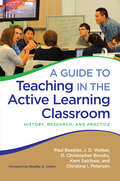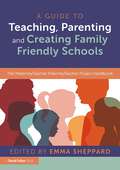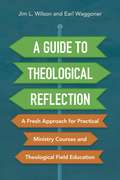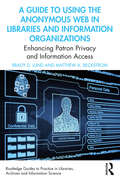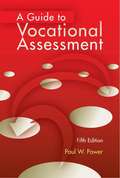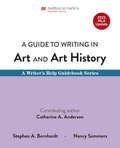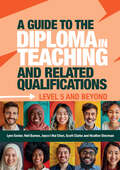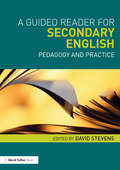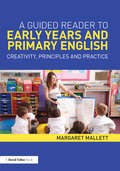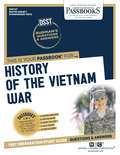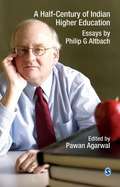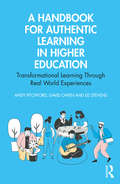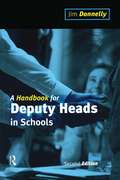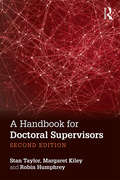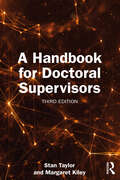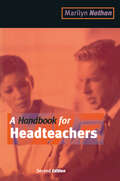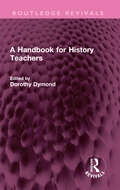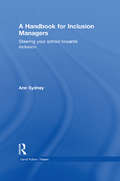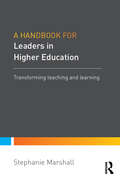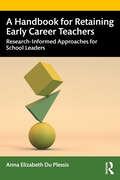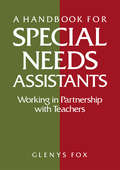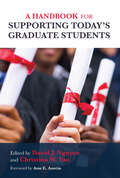- Table View
- List View
A Guide to Teaching in the Active Learning Classroom: History, Research, and Practice
by D. Christopher Brooks Paul Baepler J. D. Walker Kem Saichaie Christina I. PetersenWhile Active Learning Classrooms, or ALCs, offer rich new environments for learning, they present many new challenges to faculty because, among other things, they eliminate the room’s central focal point and disrupt the conventional seating plan to which faculty and students have become accustomed.The importance of learning how to use these classrooms well and to capitalize on their special features is paramount. The potential they represent can be realized only when they facilitate improved learning outcomes and engage students in the learning process in a manner different from traditional classrooms and lecture halls.This book provides an introduction to ALCs, briefly covering their history and then synthesizing the research on these spaces to provide faculty with empirically based, practical guidance on how to use these unfamiliar spaces effectively. Among the questions this book addresses are:• How can instructors mitigate the apparent lack of a central focal point in the space?• What types of learning activities work well in the ALCs and take advantage of the affordances of the room?• How can teachers address familiar classroom-management challenges in these unfamiliar spaces?• If assessment and rapid feedback are critical in active learning, how do they work in a room filled with circular tables and no central focus point?• How do instructors balance group learning with the needs of the larger class?• How can students be held accountable when many will necessarily have their backs facing the instructor?• How can instructors evaluate the effectiveness of their teaching in these spaces?This book is intended for faculty preparing to teach in or already working in this new classroom environment; for administrators planning to create ALCs or experimenting with provisionally designed rooms; and for faculty developers helping teachers transition to using these new spaces.
A Guide to Teaching, Parenting and Creating Family Friendly Schools: The MaternityTeacher PaternityTeacher Project Handbook
by Emma SheppardAt The MTPT Project we know that teaching can be a sustainable career choice for parents, and in this essential handbook, we show you how. Supported by case studies celebrating the best that the family friendly schools and happy teachers in our community have to offer, this book is a lifeline for both educators aspiring to combine their passion for teaching with becoming a parent, and the school leader who wants to empower them. However you become a parent, or choose to grow your family and your career, this handbook will provide you with the guidance and cheerleading that you need to fulfil your personal and professional aspirations. The book is divided into nine chapters, guiding readers from the first considerations of family planning, all the way through to the reality that some teachers and leaders may choose to leave classrooms for good. Each chapter includes: the latest research on working families legalities associated with different stages of working parenthood (including discrimination and how to avoid it as an employer and address it as an employee) case studies from our community suggestions for individuals and schools recommended further reading. Each chapter will help you to navigate the journey from planning a family, to stepping in and out of teaching to suit your parenting needs, to creating family friendly working environments, whatever your role in school. With its mixture of research-informed solutions, hints and tips, this text is perfect for colleagues embarking on their parenting journey and school leaders who want to take practical steps to retain and empower valued colleagues.
A Guide to Theological Reflection: A Fresh Approach for Practical Ministry Courses and Theological Field Education
by Jim Wilson Earl WaggonerFeedback and evaluation, both of oneself and by others, are the lifeblood of a successful ministry experience. In A Guide to Theological Reflection, experienced practical ministry professors Jim Wilson and Earl Waggoner introduce the processes and tools of theological reflection for ministry.Effective evaluation includes critique and potential course correction for the honest and willing minister, as well as positive affirmation of how one's desires influence good ministry decisions. A Guide to Theological Reflection introduces tools by which a minister can interact with his or her own thoughts, beliefs, and feelings; external feedback, such as that of a ministry supervisor; and Scripture to inform deep and transformative theological reflection.Designed as a textbook for practical ministry courses and theological field education, A Guide to Theological Reflection can also be used in ministry contexts. It provides guidance for students, ministers-in-training, mentors, and advisors, laying a theoretical foundation for theological reflection and demonstrating step-by-step how to practice it well.
A Guide to Using the Anonymous Web in Libraries and Information Organizations: Enhancing Patron Privacy and Information Access (Routledge Guides to Practice in Libraries, Archives and Information Science)
by Brady D. Lund Matthew A. BeckstromA Guide to Using the Anonymous Web in Libraries and Information Organizations provides practical guidance to those who are interested in integrating the anonymous web into their services. It will be particularly useful to those seeking to promote enhanced privacy for their patrons. The book begins by explaining, in simple terms, what the anonymous web is, how it works, and its benefits for users. Lund and Beckstrom also explain why they believe access to the anonymous web should be provided in library and information organizations around the world. They describe how to provide access, as well as educate library users on how to utilize the anonymous web and navigate any challenges that might arise during implementation. The authors also encourage the development of library policies that guide appropriate conduct and filter content, where appropriate, in order to deter illegal activity. A Guide to Using the Anonymous Web in Libraries and Information Organizations reminds us that libraries and other information providers have a duty to educate and support their communities, while also preserving privacy. Demonstrating that the anonymous web can help them to fulfil these obligations, this book will be essential reading for library and information professionals working around the world.
A Guide to Vocational Assessment 5th Edition
by Paul W. PowerThis fifth edition of A Guide to Vocational Assessment acknowledges the changes in social and economic systems facing adults with disabilities. It suggests multiple evaluation approaches and insights that can be used to change the difficult to the possible and eventually to the probable. While many chapters underscore the use of traditional evaluation approaches, other chapters operationalize vocational assessment as an individualized, creative, empowering, holistic process and experience of self-discovery.
A Guide to Writing in Art and Art History with 2021 MLA Update: A Writer's Help Guidebook Series
by Nancy Sommers Stephen A. BernhardtThis ebook has been updated to provide you with the latest guidance on documenting sources in MLA style and follows the guidelines set forth in the MLA Handbook, 9th edition (April 2021).A Guide to Writing in Art and Art History, part of the Writer’s Help Guidebook Series, offers writing and research support for students writing in the discipline. This compact yet comprehensive guidebook provides the value students want with the essential instruction they need to complete writing tasks successfully. Students will find advice on how to think, read, research, and design and write papers and projects like an art professional.
A Guide to the Diploma in Teaching and Related Qualifications: Level 5 and beyond
by Lynn Senior Neil Barnes Joyce I-Hui Chen Scott Clarke Heather ShermanThis one-stop resource for trainee teachers within the Further Education and Skills Sector (FES) incorporates all the core requirements of the new Diploma in Teaching (DiT) for FES. Also, fully linked to the occupational and professional standards developed for the FE teaching landscape.This book provides both new and existing teachers with information and support for a career in the sector, as it is fully aligned with the latest government requirements. It emphasises what it means to be a teacher, the centrality of the learner, and the need for teaching to be less about the process and more about the personal.Content delves into a greater focus on subject-based pedagogy and on placements, as well as in-depth coverage of topics related to SEND, digital and online pedagogies, planning teaching and learning and the final assessment/viva.For readers to engage in critical reflection and apply knowledge to practice, the text is packed with critical thinking tasks at level 5 and extension tasks for those working at levels 6 and 7. Evidence-informed practice and research also underpin each chapter.Key features: Covers all level 5 and beyond qualifications for the sector, incorporating the Diploma in teaching and the Level 5 apprenticeship standards Maps to the sector’s occupational standards and professional standards and includes information on placements and the final assessment / viva Responds to the new emphases on subject pedagogy and the centrality of the learner in the learning process Built in development with extensions to levels 6 and 7 Fully embraces digital and online pedagogies
A Guidebook for Teaching Independent Living Skills: A Guidebook For Teaching Independent Living Skills
by Kathy BullA Guided Reader for Secondary English: Pedagogy and practice
by David StevensThe Guided Reader for Secondary English draws on extracts from the published work of some of the most influential education writers to provide insight, guidance and clarity about key issues affecting Secondary English teachers. The book brings together key extracts from classic and contemporary writing and contextualises these in both theoretical and practical terms. The extracts are accompanied by a summary of the key ideas and issues raised, questions to promote discussion and reflective practice, and annotated further reading lists to extend thinking. Taking a thematic approach and including a short introduction to each theme, the chapters cover: Theoretical models of curricular English The nature and structure of the Secondary School English curriculum Historical perspectives Texts and intertextuality The arts context for secondary English Assessment and evaluation Linguistic and cultural contexts Future possibilities and tensions Aimed at trainee and newly qualified teachers including those working towards Masters level qualifications, as well as existing teachers, this accessible, but critically provocative text will be an essential resource for those that wish to deepen their understanding of Secondary English Education.
A Guided Reader to Early Years and Primary English: Creativity, principles and practice
by Margaret MallettA Guided Reader to Early Years and Primary English draws on extracts from the published work of some of the most influential education writers to provide insight, guidance and clarity about key issues affecting early years practitioners and primary English teachers. The book brings together key extracts from classic and contemporary writing and contextualises these in both theoretical and practical terms. The extracts are accompanied by a summary of the key ideas and issues raised, questions to promote discussion and reflective practice, and annotated further reading lists to extend thinking. Taking a thematic approach and including a short introduction to each theme, the chapters cover: Models of and approaches to early years and primary English; Speaking and listening in English lessons: story-telling, drama, ‘booktalk’ and debate; Reading and responding to texts in English lessons; Writing in English lessons: finding a ‘voice’; Knowledge about language: grammar, spelling, punctuation and handwriting; The rich landscape of children’s literature; Non-fiction in English lessons; Planning, assessing and recording children’s progress: the learning cycle. Aimed at trainee and newly qualified teachers, those working towards Masters level qualifications and all those involved in the teaching of early years and primary English, this accessible, but critically provocative text will be an essential resource for those that wish to deepen their understanding of early years and primary English education.
A HISTORY OF THE VIETNAM WAR: Passbooks Study Guide (DANTES Subject Standardized Tests (DSST))
by National Learning CorporationThe DSST Subject Standardized Tests are comprehensive college and graduate level examinations given by the Armed Forces, colleges and graduate schools. These exams enable students to earn college credit for what they have learned through self-study, on the job, or by other non-traditional means. The DSST A History of the Vietnam War Passbook® prepares candidates for the DSST exam, which enables schools to award credit for knowledge acquired outside the normal classroom environment. It provides a series of informational texts as well as hundreds of questions and answers in the areas that will likely be covered on your upcoming exam, including but not limited to: pre-war culture and history; American policies and strategies; military battles; post-war legacies and influences; and more.
A Half-Century of Indian Higher Education
by Pawan AgarwalA Half-Century of Indian Higher Education features a select collection of writings on Indian higher education by Professor Philip G. Altbach. Professor Altbach's research papers and articles on Indian higher education--published in journals, periodicals, newspapers and books worldwide--not only established him as a noted expert on Indian higher education but also inspired numerous studies in this area. This volume, edited by Pawan Agarwal, brings together 34 seminal writings of Professor Altbach on universities and colleges, knowledge production and distribution, academic profession, globalization and open-door policies, academic publishing, campus politics and comparative studies on Indian and Chinese systems. The articles provide an invaluable access to the various issues that have profoundly shaped India's higher education system during the last five decades. They give a comprehensive reading of the development of higher education in post-Independence India in a simple yet gripping style and affirm Professor Altbach's enduring commitment to this area. The book includes in-depth reflective articles for each of its seven sections by well-known experts on higher education. It also features an insightful interview with Professor Altbach that illuminates many vital areas of higher education worldwide.
A Handbook for Authentic Learning in Higher Education: Transformational Learning Through Real World Experiences
by David Owen Andy Pitchford Ed StevensAn accessible resource to develop authentic learning and teaching in higher education, this book challenges conventional teaching practice and presents meaningful and impactful alternatives across disciplines that are research informed, student-centred and achievable. Bringing together a wide range of contemporary examples, this essential text shows how academics from an increasing range of disciplines and fields have shifted their attention away from the restrictions of campus-based education. Using engaging case study material, underpinned by cutting edge research, the text shares innovations from over 50 different institutions, offers practical advice on how to facilitate authentic learning in real world contexts and examines the range of alternative assessment techniques available to the contemporary teacher. A Handbook for Authentic Learning in Higher Education is ideal reading for early career academics exploring approaches to learning, established academics searching for practical guides to emergent pedagogies and all those responsible for leading teaching and learning practices within their department or institution.
A Handbook for Deputy Heads in Schools
by Donnelly, JimAims to provide deputy heads with a practical guide to their complex role in schools. Drawing on his own experience, and mindful of the increasing managerial demands of a more competitive education system, the author offers advice on managing staff, student care, examinations and much more.
A Handbook for Doctoral Supervisors
by Stan Taylor Margaret Kiley Robin HumphreyAcross the globe, doctoral education is in the throes of change. Diversification, regulation and proliferation are just a few of the developments that pose major challenges for those supervising doctoral candidates. The second edition of A Handbook for Doctoral Supervisors has been fully updated to assist doctoral supervi
A Handbook for Doctoral Supervisors
by Stan Taylor Margaret KileyBased on the latest research and covering key recent developments in supervisory practice, the third edition of A Handbook for Doctoral Supervisors is designed to support new and established supervisors in reviewing how they may make their supervision practice more effective day to day. This new edition is fully updated and extended to provide guidance on all aspects of the supervisory role, including: Recruitment and selection, including placing greater emphasis on candidate diversity; Establishing and managing research projects, from initial conception through to completion and examination; Relationships with candidates and co-supervisors, and the implementation of an explicit respect agenda in relationships with candidates; Providing personal, professional, and career advice, including monitoring the wellbeing and mental health of doctoral candidates; The implications for supervisors of the rapid adoption of online supervision and examination. With a self-interrogatory style which enables supervisors to reflect upon and, where appropriate, consider how to enhance their practice, this key handbook is a crucial read for those directly involved in doctoral supervision, those who manage supervisors, as well as policy-makers, administrators, and scholars within the field of doctoral education.
A Handbook for Headteachers
by Nathan, MarilynRevised and updated for the second edition, this practical guide covers all aspects of the headteacher's management role. It includes case studies throughout, together with new material on the NPQH, IT and ICT, curriculum changes and school development.
A Handbook for History Teachers (Routledge Revivals)
by Dorothy DymondFirst Published in 1929 A Handbook for History Teachers is an attempt on the part of a number of teachers (many of them members of the S. E. London branch of the Historical Association) to offer some practical help in the choice of historical material for children. It discusses themes like schemes of work in elementary junior and senior schools, textbooks for pupils under fifteen, class library books for pupils under fifteen, book lists for teachers, and sources for the preparation of history stories by the teacher. This is an essential read for history teachers and education.
A Handbook for Inclusion Managers: Steering your School towards Inclusion (nasen spotlight)
by Ann SydneyAre you responsible for inclusion in your school? As an Inclusion Manager, you have a strategic role that covers a great deal more than special educational needs, and requires a specific knowledge and skill set in order to steer your school towards inclusion. A Handbook for Inclusion Managers presents a wide range of information, providing plenty of fresh ideas and a stimulus for reflection on your practice. This comprehensive and accessible text examines recent legislation, including the Common Assessment Framework, and provides information on how to gain accreditation for your work on inclusion. It will help you to create and manage an inclusive school, covering a wide range of knowledge and skills including: getting the best from your staff how to interpret data to judge the achievement of different groups in your school where the money for inclusion comes from what inclusive teaching and learning look like working with special schools community cohesion reporting to governors, parents and Ofsted working on an inclusion strategy. Providing a framework which can be adapted to suit individual schools, A Handbook for Inclusion Managers includes a checklist of good practice to enable you to keep track of your school’s progression. The author provides numerous references to useful organisations, websites and publications to make your life easier. This invaluable companion for Inclusion Managers, SENCos and anyone working on inclusion gathers together the background information and practical advice you need to successfully manage a truly inclusive learning environment.
A Handbook for Leaders in Higher Education: Transforming teaching and learning
by Stephanie MarshallWritten to assist those seeking to understand the key global drivers, and an overview of key challenges facing senior leaders and managers today, this book focuses on the complex and highly politicised area of teaching and learning in higher education. Providing tried and tested tips and techniques for addressing the ‘why, what and how’ of leadership and management theory and practice, it is firmly grounded in the context of the teaching and learning arena. A Handbook for Leaders in Higher Education: Transforming teaching and learning can be dipped into to provide knowledge and understanding of theory, best practice examples, case study exemplars and reflective practice activity. It is structured in four main parts: A view from the top The leadership and management perspective Engendering a change culture Looking to the future. This handbook is informed by senior leaders and experts with expertise in delivering excellent practice in teaching and learning at international, national and institutional levels. Responding to the need of universities to take the lead in changing cultures and working practices, this book is an essential and forward-looking text for both scholars and practitioners in the senior teams of higher education institutions.
A Handbook for Retaining Early Career Teachers: Research-Informed Approaches for School Leaders
by Anna Elizabeth Du PlessisThis book addresses the global concern of teacher attrition rates, particularly those who walk away from the profession within the first five years. The author offers new knowledge about the factors that influence beginning teachers’ career decisions through an in-depth examination of their lived experiences. Using a unique lens that explores the complexities of a beginning teacher’s classroom through its many attendant axiological, structural, interpersonal, and practical contexts, the book presents strategies that address the deep matters of retention in the educational arena. Using its insights, school leaders are enabled to shift the balance of school policy understanding towards beginning teachers’ acute needs for support. Based on an empirical study of more than 2,000 beginning teachers and school leaders, this book reveals perceptions, truths, and lived experiences in order to guide the development of effective retention strategies and policies, which are fundamental to stabilising the teacher workforce.
A Handbook for Special Needs Assistants: Working in Partnership with Teachers
by Glenys FoxFirst Published in 1994. Routledge is an imprint of Taylor & Francis, an informa company.
A Handbook for Student Engagement in Higher Education: Theory into Practice (SEDA Series)
by Lowe Tom Hakim Yassein ElDrawing on scholarship as well as established practice, A Handbook for Student Engagement in Higher Education is a sector-leading volume that unpacks the concept of student engagement. It provides ideas and examples alongside compelling theory- and research-based evidence to offer a thorough and innovative exploration of how students and staff can work together to genuinely transform the higher education learning experience. Providing readers with evidence from successfully embedded schemes, the book uses case studies and practical, workable examples from a variety of international institutions. With the insight of world-leading contributors, it showcases what good practice looks like in higher education institutions across the globe. Simultaneously collating a wealth of contemporary research, this book creates vivid connections between theories and student engagement in higher education, with chapter topics including: Creating relationships between students, staff and universities Offering non-traditional students extracurricular opportunities Taking a students-as-partners approach Critically reflecting on identities, particularities and relationships The future of student engagement. In a fast-developing and significantly shifting area, this book is essential reading for higher education managers and those working directly in the field of student engagement.
A Handbook for Supporting Today's Graduate Students
by David J. NguyenDespite continued growth in enrollments, graduate program attrition rates are of great concern to academic program coordinators. It is estimated that only 40 to 50 percent of students who begin Ph.D. programs complete their degrees. This book describes programs, initiatives, and interventions that lead to overall student retention and success.Written for graduate school administrators, student affairs professionals, and faculty, this book offers ways to better support today’s graduate student population, addresses the needs of today’s changing student demography and considers the challenges today’s graduate students face inside and outside of the classroom. The opening section highlights the shifting demographics and contextual factors shaping graduate education over the past 20 years, while the second describes institutional practices to develop the requisite academic and professional development necessary to succeed in master’s and doctoral programs. In conclusion, the editors curate a conversation about different ways institutions can support graduate students beyond the classroom.
